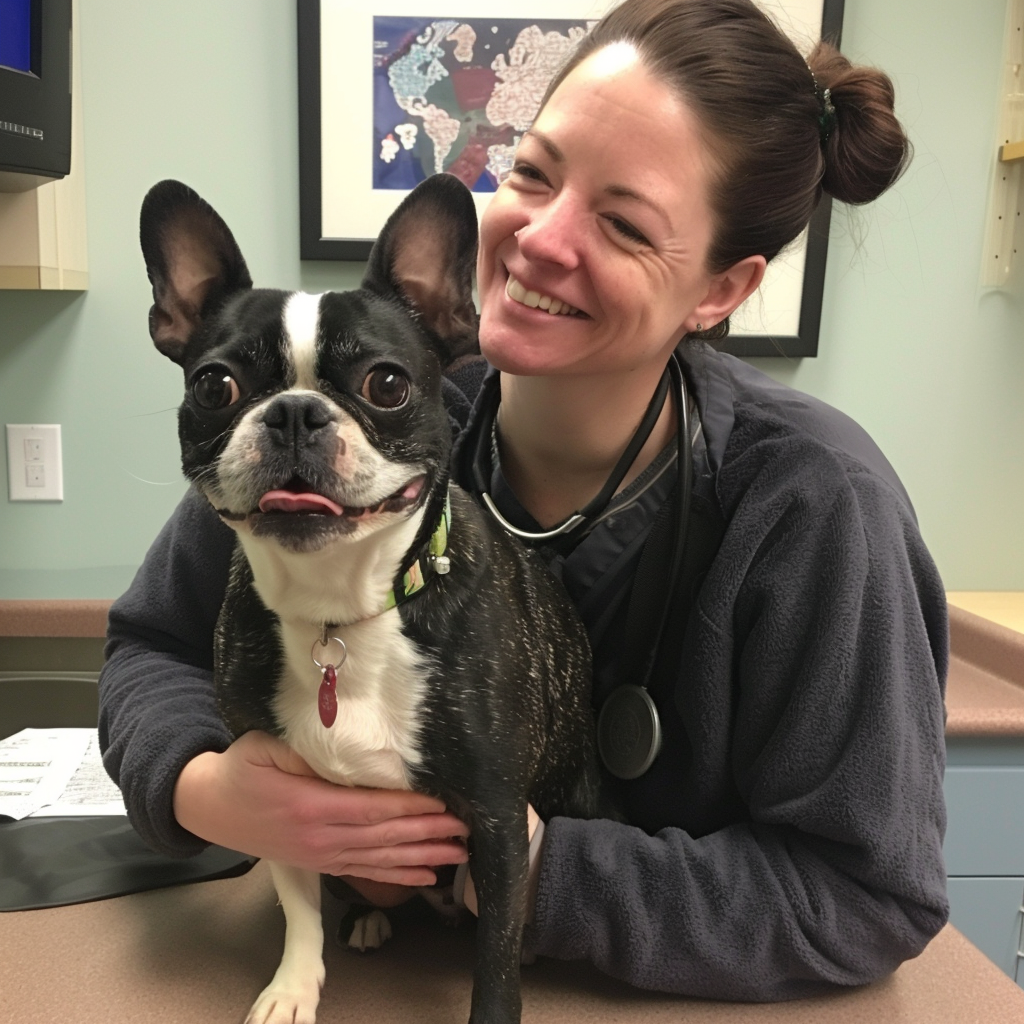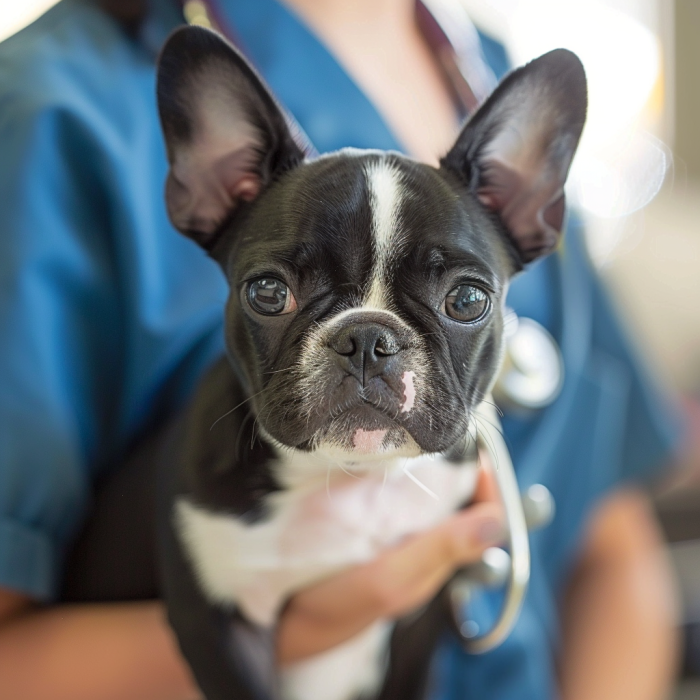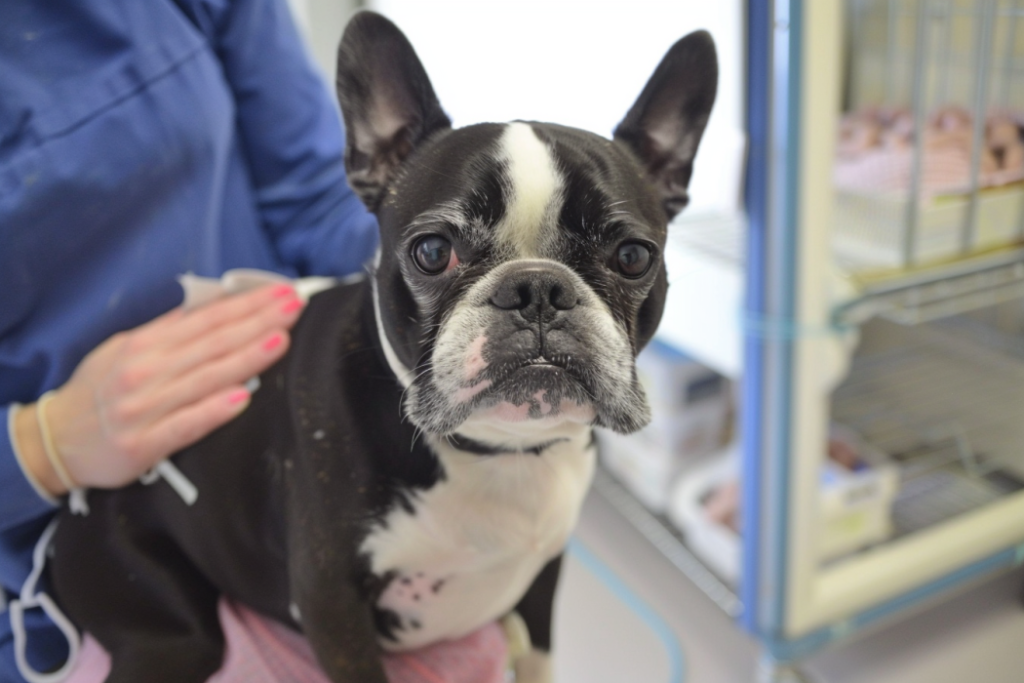Navigating the path of a Boston Terrier’s pregnancy is a journey filled with anticipation, preparation, and a dash of wonder. From the moment of conception to the joyous day of delivery, each step is crucial and enveloped in a bubble of care and attention. Let’s delve into this special process, sharing essential insights and tips to ensure a smooth and healthy experience for both the expecting mother and her future pups.

Essential Insights on Boston Terrier Pregnancy and Delivery
Boston Terriers, known for their affable nature and distinctive looks, require careful attention during their pregnancy. Here’s what you need to know:
- Pregnancy Duration: Typically, a Boston Terrier’s pregnancy lasts about 63 days, but this can vary slightly.
- Ideal Age for Pregnancy: The optimal time for a Boston Terrier to become pregnant is after she’s reached at least 18 months of age, ensuring she’s fully matured.
- Recognizing Pregnancy: Look for early signs such as a slight increase in appetite, mild behavior changes, and nipple growth.
It’s crucial to seek veterinary advice to confirm the pregnancy and receive tailored guidance.
As the pregnancy progresses, visible signs become more pronounced. Expect a gradual increase in belly size, more frequent napping, and changes in appetite. These natural shifts mark the stages of development as the due date approaches.
Identifying Pregnancy Symptoms
Identifying the early signs of pregnancy in a Boston Terrier can be both exciting and a bit challenging, given that the initial symptoms are often subtle. As the weeks progress, however, the symptoms become more pronounced, helping to confirm the pregnancy. Here’s a detailed look at the symptoms Boston Terrier owners might observe:
Early Pregnancy Symptoms (Weeks 1-3)
- Mild Fatigue: You might notice your Boston Terrier seems a bit more lethargic than usual, preferring rest over activity.
- Slight Changes in Appetite: Some dogs may experience a slight decrease in appetite early on, while others could start showing an increase sooner than expected.
- Behavioral Changes: Your Boston Terrier may seek more affection or, conversely, prefer solitude. These behavioral changes are due to hormonal fluctuations.
Mid-Pregnancy Symptoms (Weeks 4-6)
- Weight Gain: This is when you’ll start to see noticeable weight gain. The belly doesn’t just look fuller; it starts to round out due to the growing fetuses.
- Increased Appetite: As the pregnancy progresses, her appetite will likely increase to support the growing demand for nutrients from the developing puppies.
- Nipple Growth and Color Change: The nipples become more prominent, larger, and may darken in color as they prepare for milk production.
Later Pregnancy Symptoms (Weeks 7-9)
- Abdominal Enlargement: By now, the enlargement of the abdomen is quite evident, and you may even begin to feel the puppies move.
- Nesting Behavior: As the birth approaches, your Boston Terrier might start looking for a safe and comfortable place to deliver. This behavior includes gathering blankets or towels to create a cozy space.
- Visible Puppy Movement: Especially in the later stages, you might see the puppies moving inside the belly, a clear indication that the due date is near.

Week-by-Week Pregnancy Guide
Weeks 1-2: Initial Stages
The journey begins in quiet, with few outward signs as the embryos implant and begin to grow.
Weeks 3-4: Veterinary Confirmation
Around this time, a visit to the vet can confirm the pregnancy through ultrasound. Nutritional needs increase, emphasizing the importance of a balanced diet.
Weeks 5-6: Visible Changes
The expectant mother’s abdomen expands noticeably. Her appetite may surge as she nourishes the growing pups.
Weeks 7-8: Nesting Behavior
As delivery nears, nesting behavior becomes apparent. She may start looking for a quiet, comfortable place to give birth.
Week 9: The Homestretch
In the final days, the mother may eat less and seem restless. These are signs that labor is imminent.
Preparing for Birth
Preparing for the birth of Boston Terrier puppies is an exciting, crucial phase that requires careful planning and attention to detail. As your Boston Terrier’s due date approaches, it’s essential to ensure that everything is in place for a smooth, stress-free delivery. Here’s a comprehensive guide to help you prepare for the arrival of the new puppies:
Set Up a Whelping Box
- Comfort and Security: Choose a quiet, warm, and secluded area of your home to set up the whelping box. This space should be away from high traffic areas to give the mother privacy and peace.
- Whelping Box Essentials: The box should be large enough for your Boston Terrier to move around comfortably but with low enough sides for her to step over easily. Line the box with soft, clean blankets or towels for warmth and comfort. Have extra bedding available for changing after the birth.
Gather Necessary Supplies
- Whelping Supplies: Prepare a kit that includes clean towels, a small scale for weighing the puppies, a bulb syringe for clearing their airways, clean scissors for cutting the umbilical cords, and iodine for disinfecting the cord stumps.
- Emergency Supplies: Although most Boston Terrier deliveries go smoothly, it’s wise to have the contact information for your vet or an emergency vet clinic readily available. Also, include a transport crate for the mother, should you need to rush her to the vet.

Monitor Health and Comfort
- Veterinary Check-ups: Ensure your Boston Terrier has been receiving regular prenatal check-ups. In the final weeks, consult with your veterinarian to discuss the birth process and any signs of potential complications.
- Comfort Measures: Keep the mother comfortable and stress-free in the weeks leading up to the birth. Provide her with a nutritious diet and plenty of fresh water, and maintain a routine that includes gentle exercise and lots of rest.

Know the Signs of Labor
- Temperature Drop: About 24 hours before labor starts, your Boston Terrier’s body temperature will drop below 100°F (37.8°C). Begin taking her temperature twice daily as the due date approaches to catch this sign.
- Behavioral Changes: Watch for signs of restlessness, nesting behavior, loss of appetite, and panting. These behaviors indicate that labor is imminent.
During the Birth
- Be Present: While it’s important not to interfere unnecessarily, being present can provide reassurance to the mother. It also allows you to monitor for any problems and intervene if necessary.
- Post-Birth: Ensure each puppy is breathing well and encourage them to nurse as soon as possible. Check that the mother is cleaning the puppies and removing the amniotic sacs.
Post-Delivery
The period immediately following the delivery of Boston Terrier puppies is critical for both the mother and her newborns. Post-delivery care focuses on ensuring the mother recovers well and the puppies are healthy, thriving, and beginning their lives in the best possible condition. Here’s a comprehensive guide to navigating the post-delivery phase:
Caring for the Mother
- Health Monitoring: In the days following birth, closely monitor the mother for signs of postpartum complications, such as infection (metritis), lack of interest in her puppies, excessive bleeding, or unusual discharge.
- Nutrition: The mother’s nutritional needs will be significantly higher during lactation. Provide a high-quality, nutrient-rich diet to support milk production. Fresh water should always be available, as nursing dogs require more fluids.
- Comfort and Rest: Ensure the mother has a comfortable, quiet place to rest and nurse her puppies. Although she will spend most of her time with her newborns, she should also have the opportunity to take short breaks for bathroom trips and a little exercise.
Caring for the Newborn Puppies
- Feeding: Newborn puppies should begin nursing within the first couple of hours after birth. Monitor the puppies to ensure they are latching properly and feeding regularly.
- Warmth: Puppies cannot regulate their body temperature for the first few weeks. Keep the whelping box in a warm, draft-free area. Consider using a heat lamp or heating pad, making sure there is enough space for the puppies to move away from the heat source if they become too warm.
- Weight Monitoring: Weigh the puppies daily for the first few weeks to ensure they are gaining weight. A healthy puppy should steadily gain weight each day.
- Health Checks: Look for signs of illness or distress, such as crying continuously, not nursing, or isolation from the litter. Early detection of health issues is crucial for prompt treatment.

Veterinary Care
- Initial Check-up: Schedule a postnatal check-up for the mother within 24 hours after delivery to ensure there are no retained placentas or other complications. The puppies should also be examined to confirm they are healthy and developing normally.
- Vaccinations and Deworming: Discuss a vaccination and deworming schedule with your veterinarian. Puppies typically receive their first round of vaccinations between 6 to 8 weeks of age.
Socialization and Handling
- Gentle Handling: Early, gentle handling of the puppies can benefit their development. It helps them become comfortable with human interaction, which is crucial for socialization.
- Environmental Exposure: As the puppies grow, gradually expose them to various sounds, sights, and experiences to help them become well-adjusted dogs.
Documentation and Identification
- Keeping Records: Maintain detailed records of each puppy’s weight gain, health check results, vaccination dates, and any other relevant information.
- Identification: If you have a large litter, use non-toxic markers, colored collars, or yarn to identify each puppy. This makes tracking their growth and development easier.
The post-delivery period is both demanding and incredibly rewarding. By providing meticulous care for the mother and her puppies, you ensure they have the strongest start to their new lives together. This foundation of health, nutrition, and early socialization is crucial for the puppies to grow into healthy, happy, and well-behaved Boston Terriers.

Key Takeaways
- Preparation and Knowledge are Vital: Understanding the signs of pregnancy, the week-by-week development, and preparing for birth and post-delivery care are crucial steps in ensuring the health and well-being of both the mother and her puppies.
- Veterinary Support is Essential: Regular check-ups, confirming pregnancy, monitoring the health of the mother during pregnancy, and postnatal care for the mother and puppies are indispensable parts of the process.
- The Importance of a Nurturing Environment: Providing a safe, comfortable, and loving environment throughout the pregnancy, birth, and early life stages helps ensure the physical and emotional well-being of the mother and her offspring.
- The Joy of Life: Despite the challenges and responsibilities that come with breeding and caring for Boston Terriers during pregnancy and birth, the joy and fulfillment of witnessing the miracle of life and nurturing the newborn puppies are incomparable.
A Closing Thought
For those who embark on this journey, the experience of supporting their Boston Terrier through pregnancy and birth is not just about the care and tasks involved. It’s about witnessing the cycle of life, contributing to the health and happiness of the canine family, and ensuring the puppies are given the best start in life. It’s a journey of love, commitment, and learning, filled with moments of wonder, concern, and immense satisfaction.
As we conclude this guide, remember that each pregnancy and birth is unique. There may be unexpected turns along the way, but with preparation, knowledge, and support, pet owners can navigate these challenges successfully. The arrival of new puppies is a remarkable event, bringing new challenges and joys. Embrace this special time with your Boston Terrier, cherishing each moment of this extraordinary journey.
FAQ
How many puppies do Boston Terriers usually have?
Boston Terriers commonly have litters consisting of 3 to 5 puppies. This relatively small litter size is characteristic of the breed, although factors such as the mother’s health, age, and genetics can influence the total number of puppies born. Veterinary supervision during pregnancy can provide insights into litter size through ultrasound examinations.
How long is a Boston Terrier pregnant?
The gestation period for Boston Terriers, like most dogs, averages around 63 days from conception. However, this duration can slightly vary by a few days depending on individual circumstances. Veterinarians can use a combination of hormonal testing and ultrasounds to more accurately predict the due date.
When can Boston Terrier puppies leave their mom?
Boston Terrier puppies are best separated from their mother and rehomed at about 8 weeks of age. This timeframe allows them to fully wean off their mother’s milk and start eating solid food, ensuring they receive the necessary nutrition for healthy development. Moreover, the 8-week mark is crucial for puppies to learn important social and behavioral cues from their mother and littermates, aiding in their social development and making them better equipped for adjustment to new environments.
How do I know if my Boston Terrier is pregnant?
Recognizing pregnancy in Boston Terriers involves observing several signs, including noticeable weight gain, an increase in appetite, nipple growth and darkening, and changes in behavior such as seeking more affection or displaying nesting behaviors. Veterinary confirmation is advised for an accurate diagnosis. Vets can perform an ultrasound around 28-35 days into the pregnancy or palpate the abdomen to feel for puppies at around 3-4 weeks post-breeding. Additionally, hormone tests can confirm pregnancy.
How do I know my dog is ready for a c-section?
A c-section, or cesarean section, might be necessary if there are signs of distress in the mother or complications during labor. Indicators include more than 2 hours passing without the birth of a puppy despite the mother showing active labor signs, visible distress or excessive panting without progression in labor, or knowledge of a particularly large puppy that may cause birthing complications. Veterinary intervention is critical to assessing the situation and deciding the best course of action, often relying on physical examination, the mother’s health history, and possibly imaging techniques like ultrasound to make an informed decision.
What is littermate syndrome in Boston Terriers?
Littermate syndrome describes the potential behavioral complications that can arise when puppies from the same litter (or of a similar age if not siblings) are raised together without adequate individual training and socialization. These puppies may become overly dependent on each other, leading to difficulties in learning to interact with humans and other dogs. They might exhibit high levels of anxiety when separated and could struggle with training and socialization, as their bond with each other can interfere with their relationships outside the sibling dynamic. To mitigate these risks, it’s essential to focus on separate training sessions, individual socialization opportunities, and sometimes even separating them for parts of the day to ensure each puppy develops a strong, independent character.







